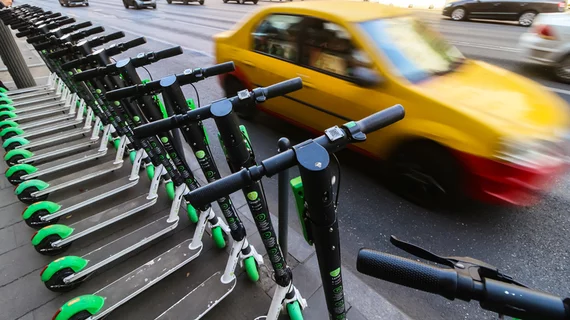Radiologists advocate for speed limits, more education on controversial e-scooters
University of Indiana radiology researchers are pushing for public education and possibly speed limits for electronic scooters, which have exploded in popularity but are causing headaches in some communities.
They’re backing up their claims with a new study on scooter-related injuries, revealed at the Radiological Society of North America’s annual meeting on Tuesday, Dec. 3. Indianapolis recently made dock-less scooters—operated under brands such as Bird and Lime—legal last year, but that’s come with a rash of injuries. Other municipalities have grappled with whether to do the same after at least 11 individuals have died stemming from their use.
With all of this in mind, Mohsin Mukhtar, MD, and colleagues set out to better understand the spike of accidents around the Indianapolis area. They noted that more than half of those who received x-rays or CT scans at IU following a scooter accident were found to have injuries.
"We believe that many users are not fully aware of the potential significant injuries that may occur with e-scooter use," Mukhtar, an IU radiology resident, said in an RSNA announcement. "Raising awareness and doing further research on this topic could inform future policy."
IU School of Medicine researchers were able to identify 69 imaging exams performed on 36 individuals in the ED over the last five years. Most commonly, CT and x-ray scans targeted the head, face and cervical spine. Nineteen of the 36 patients had radiologically apparent injuries, most often in upper extremities such as the wrist.
Oftentimes, records were missing documentation of the type of scooter involved in an accident, leading Mukhtar and colleagues to estimate that another 200 instances of injury may have stemmed from using the vehicles. Improving the specificity of injury documentation is paramount, they argued.
E-scooters can reach speeds of 20 miles per hour with no corresponding need for helmets or other safety measures. This also underlines the need for more studies and regulations to better control their proliferation, added co-author and fellow radiology resident Aiza Ashraf, MD.
"Limiting e-scooter speed could reduce the overall incidence and severity of injuries in the event of a fall or collision," she said in the announcement. "And since these e-scooters could be viewed as a potential public health hazard, we would recommend public education on the use of these devices."

